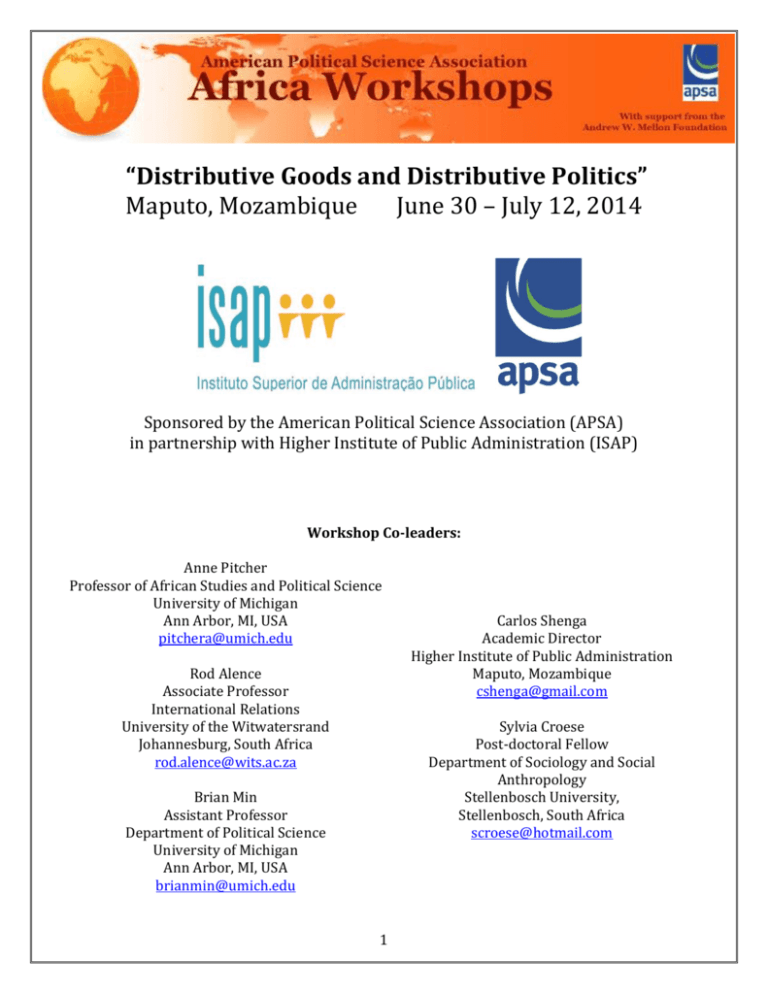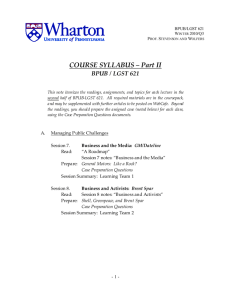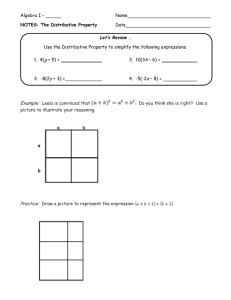Distributive Goods and Distributive Politics
advertisement

“Distributive Goods and Distributive Politics” Maputo, Mozambique June 30 – July 12, 2014 Sponsored by the American Political Science Association (APSA) in partnership with Higher Institute of Public Administration (ISAP) Workshop Co-leaders: Anne Pitcher Professor of African Studies and Political Science University of Michigan Ann Arbor, MI, USA pitchera@umich.edu Rod Alence Associate Professor International Relations University of the Witwatersrand Johannesburg, South Africa rod.alence@wits.ac.za Carlos Shenga Academic Director Higher Institute of Public Administration Maputo, Mozambique cshenga@gmail.com Sylvia Croese Post-doctoral Fellow Department of Sociology and Social Anthropology Stellenbosch University, Stellenbosch, South Africa scroese@hotmail.com Brian Min Assistant Professor Department of Political Science University of Michigan Ann Arbor, MI, USA brianmin@umich.edu 1 Workshop Description: In countries that are democratic and autocratic, resource rich and resource poor, ruling parties routinely pledge to distribute some set of goods to citizens. These goods may be public goods such as electricity, education, or healthcare; or they may be club goods such as higher salaries and benefits for trade unionists, or fertilizer subsidies for farmers. Why do governments offer such goods, what kinds of goods do they deliver, and who are the intended or actual beneficiaries? Where ruling parties allocate goods, are they buying or rewarding loyalty; or are they actually responding to demands articulated by voters, their own supporters, or vocal opponents? This APSA workshop is intended to give students a theoretical and empirical understanding of distributive politics across different regions and under different regime types. Readings are organized in thematic units. Each unit will probe a certain feature of distributive politics: What is distributive politics? What do governments distribute? Whom do governments target? Where do benefits go? When does distribution occur? How does distribution work? Why do governments distribute? Does it work? Do voters respond? Course Materials: Herbert Kitschelt and Steven Wilkinson. 2007. Patrons, Clients, and Policies: Patterns of Democratic Accountability and Political Competition. Cambridge: Cambridge University Press. [paperback] Tufte, Edward R., Data Analysis for Politics and Policy. Cheshire, CT: Graphics Press, 2006. [pdf] Verzani, John, simpleR: Using R for Introductory Statistics. Unpublished. http://cran.rproject.org/doc/contrib/Verzani-SimpleR.pdf. [pdf] World Bank/Unicef. 2009. Abolishing School Fees in Africa: Lessons from Ethiopia, Ghana, Kenya, Malawi and Mozambique. Washington, DC: World Bank.[pdf] All other readings are journal articles or book chapters and are included in a printed course pack. 2 Schedule of Readings and Discussions: MONDAY, JUNE 30 Session 1: What is distributive politics? What goods do governments distribute? Required Reading: Golden, Miriam and Brian Min. 2013. “Distributive Politics around the World”. Annual Review of Political Science. 16:73-99. Kitschelt, Herbert and Steven Wilkinson, “Citizen-Politician Linkages: An Introduction” In Kitschelt and Wilkinson, 2007. Patrons, Clients, and Policies: Patterns of Democratic Accountability and Political Competition. Cambridge: Cambridge University Press. pp. 1-49. Stokes, Susan, Thad Dunning, Marcelo Nazareno, and Valeria Brusco, “Between Clients and Citizens: Puzzles and Concepts in the Study of Distributive Politics.” In Stokes, Susan, Thad Dunning, Marcelo Nazareno, and Valeria Brusco. 2013. Brokers, Voters, and Clientelism. Cambridge: Cambridge University Press, pp. 3-27. Carbone, Giovanni. 2011. “Do New Democracies Deliver Social Welfare? Political Regimes and Health Policy in Ghana and Cameroon”, Democratization, 19, 2: 157-183. Recommended Reading: Levitt, Steven and James Snyder. 1997. “The Impact of Federal Spending on House Election Outcomes.” Journal of Political Economy, 105(1): 30-53. Boix, Carles. 2001. “Democracy, development, and the public sector.” American Journal of Political Science 45(1):1–17. Methods 1: Introduction to statistical research Required Reading: Tufte, Edward R. 2006. Data Analysis for Politics and Policy. Cheshire, CT: Graphics Press, pp. 1-30. (Chapter 1) Recommended Reading: Tufte, Edward R. 2006. Data Analysis for Politics and Policy. Cheshire, CT: Graphics Press, pp. 31-64. (Chapter 2) 3 TUESDAY, JULY 1 Session 2: Whom do governments target with distributive goods and services? Core or swing voters? The poor or the elite? Supporters or opponents? Required Reading: Dahlberg, Matz and Eva Johansson. 2002. “On the Vote-Purchasing Behavior of Incumbent Governments.” American Political Science Review 96(1):27-40. Burgess, Robin, Remi Jedwab, Edward Miguel, Ameet Morjaria & Gerard Padró I Miquel. 2013. “The Value of Democracy: Evidence from Road Building in Kenya”, National Bureau of Economic Research Working Papers 19398. Chandra, Kanchan. “Counting Heads: A Theory of Voter and Elite Behavior in Patronage Democracies.” In Kitschelt and Wilkinson, 2007. Patrons, Clients, and Policies: Patterns of Democratic Accountability and Political Competition. Cambridge: Cambridge University Press, pp. 84-109. Michael L. Ross. 2006. “Is Democracy Good for the Poor?” American Journal of Political Science, 50(4):860–874. Elliott Green, 2011. “Patronage as Institutional Choice”, Comparative Politics, pp. 421-438. Recommended Reading: Cox, Gary W. 2007. “Swing Voters, Core Voters, and Distributive Politics.” Leitner Program Working Papers 14. Leitner Program in International & Comparative Political Economy, New Haven, US. Available at: http://www.yale.edu/leitner/papers.html Keefer, Philip, and Stuti Khemani. 2005. “Democracy, public expenditures, and the poor: understanding political incentives for providing public services. World Bank Research Observer. 20(1):1–27. Bardhan, Pranab, and Dilip Mookherjee. 2006. “Pro-poor targeting and accountability of local governments in West Bengal.” Journal of Development Economics 79(2):303–27. Blaydes, Lisa. “The politics of infrastructure provision” In Blaydes, 2011. Elections and distributive politics in Mubarak’s Egypt. Cambridge: Cambridge University Press, pp. 64-76. Min, Brian. 2013. “Electrifying the Poor: Power and Politics in India.” Unpublished manuscript. Methods 2: Introduction to R/Rstudio Required Reading: RStudio, Documentation on “Console,” “Source,” and “Projects” (browse from USB). Verzani, John, simpleR: Using R for Introductory Statistics. Unpublished, “Introduction” (section 1) and “Data” (section 2), 1-8. 4 WEDNESDAY, JULY 2 – No assigned readings THURSDAY, JULY 3 Session 3: Where do distributive goods and services go? Urban vs. rural areas /ethnic regions Required Reading: Stasavage. David. 2005. “Democracy and Education Spending in Africa.” American Journal of Political Science, 49(2):343–358. Kasara, Kimuli. 2007. “Tax me if you can: ethnic geography, democracy, and the taxation of agriculture in Africa.” American Political Science Review. 101(1):159–72. Franck, Raphael and Ilia Rainer. 2012. “Does the Leader’s Ethnicity Matter? Ethnic Favoritism, Education and Health in Sub-Saharan Africa.” American Political Science Review. 106 (2): 294-325. Margot Rubin. 2011. “Perceptions of Corruption in the South African Housing Allocation and Delivery Programme: What It May Mean for Accessing the State.” Journal of Asian and African Studies 46 (5): 479-490. Recommended Readings: Thad Dunning and Lauren Harrison. 2010. “Cross-cutting cleavages and ethnic voting: An Experimental Study of Cousinage in Mali.” American Political Science Review 104(1)1-19. Boone, Catherine. 2012. "Land Conflict and Distributive Politics in Kenya." African Studies Review, vol. 55, no. 1 (April), pp. 75-103. Weingast, Barry R., Kenneth A. Shepsle, and Christopher Johnsen. 1981. "The Political Economy of Benefits and Costs: A Neoclassical Approach to Distribution Politics." Journal of Political Economy 89 (4): 642-64. World Bank/Unicef. 2009. Abolishing School Fees in Africa: Lessons from Ethiopia, Ghana, Kenya, Malawi and Mozambique. Washington, DC: World Bank. Sylvia Croese and Anne Pitcher, 2013. “Politics, Policy and Housing Provision in Angola” Unpublished Manuscript. Methods 3: Basic data analysis Required Reading: Verzani, John, simpleR: Using R for Introductory Statistics. Unpublished, “Univariate Data” and “Bivariate Data (up to “Numerical vs. Numerical”),” 8-22 5 FRIDAY, JULY 4 Methods 4: Afrobarometer exercise Required Reading: Afrobarometer, “Data Codebook for Round 5” (skim) MONDAY, JULY 7 Session 4: When does distribution occur? Do elections matter to the timing of goods distribution? Are there electoral cycles to distribution? Required Reading: David A. Lake and Matt Baum. 2001. “The invisible hand of democracy: political control and the provision of public services.” Comparative Political Studies, 34(6):587–621. Min, Brian and Miriam Golden. 2014. ““Electoral Cycles in Electricity Losses in India” Energy Policy.65:619–625. Schady, Norbert R. 2000. “The Political Economy of Expenditures by the Peruvian Social Fund (FONCODES), 1991-95.” American Political Science Review 94(2):289-304. Blaydes, Lisa. “Electoral budget cycles and economic opportunism.” In Blaydes, 2011. Elections and distributive politics in Mubarak’s Egypt. Cambridge: Cambridge University Press, pp. 77-99. Recommended Reading: Khemani, Stuti. 2004. "Political Cycles in a Developing Economy: Effect of Elections in the Indian States." Journal of Development Economics 73:125-54. Drazen, A., & Eslava, M. 2010. “Electoral manipulation via voter-friendly spending: theory and evidence.” Journal of Development Economics, 92(1), 39–52. Cole, Shawn. 2009. "Fixing Market Failures or Fixing Elections? Agricultural Credit in India." American Economic Journal: Applied Economics 1(1):219-250. Baskaran, Thushyanthan, Brian Min and Yogesh Uppal. 2014. “Election cycles and economic activity: evidence from a quasi-experiment with Indian bye-elections.” Working paper. Methods 5: Human Development Index exercise Required Reading: UNDP, “Technical Notes: Calculating the Human Development Indices.” In Human Development Report 2013, 1-3. 6 TUESDAY, JULY 8 Session 5: How do politicians make credible promises? How do they make sure citizens respond? Clientelism, monitoring, coercion Required Reading: Van de Walle, Nicholas. “Meet the New Boss, Same as the Old Boss? The Evolution of Political Clientelism in Africa.” In Kitschelt and Wilkinson, 2007. Patrons, Clients, and Policies: Patterns of Democratic Accountability and Political Competition. Cambridge: Cambridge University Press, pp. 50-67. Keefer, Philip. 2007. “Clientelism, Credibility, and the Policy Choices of Young Democracies.” American Journal of Political Science 51(4):804-821. Robin Harding and David Stasavage. 2014. What Democracy Does (and Doesn’t do) for Basic Services: School Fees, School Inputs and Africa Elections.” Journal of Politics, 76, 1, pp. 229-245. Stokes, Susan C. 2005. “Perverse Accountability: A Formal Model of Machine Politics with Evidence from Argentina.” American Political Science Review 99 (August): 315–25. Baldwin, Kate. 2013 “Why Vote with the Chief? Political Connections and Public Goods Provision in Zambia”, American Journal of Political Science, vol. 57, no. 4 (October), pp. 794– 809. Magaloni, Beatriz, Alberto Diaz-Cayeros and Federico Estevez, “Clientelism and Portfolio Diversification: A Model of Electoral Investment with Applications to Mexico.” In Kitschelt and Wilkinson, 2007. Patrons, Clients, and Policies: Patterns of Democratic Accountability and Political Competition. Cambridge: Cambridge University Press, pp. 182-205. Recommended Reading: Hicken, Allen. 2011. “Clientelism”, Annual Review of Political Science 14: 289-310. Wantchekon, Leonard 2003. “Clientelism and Voting Behavior: Evidence from a Field Experiment in Benin,” World Politics, 55, pp. 399-422. Methods 6: Bivariate regression Required Reading: Tufte, Edward R. 2006. Data Analysis for Politics and Policy. Cheshire, CT: Graphics Press, pp. 65-134. (Chapter 3) Verzani, John, simpleR: Using R for Introductory Statistics. Unpublished, “Linear Regression,” 24-31 (skip part on “resistant regression”). Recommended Reading: Tufte, Edward R. 2006. Data Analysis for Politics and Policy. Cheshire, CT: Graphics Press, pp. 135-163. (Chapter 4) 7 WEDNESDAY, JULY 9 Session 6: Why do some politicians distribute and some don’t’? Are distributive politics effective, efficient, desirable? Are voters responsive? Required Reading: Kramon, Eric and Daniel Posner. 2013. “Who Benefits from Distributive Politics? How the Outcome One Studies Affects the Answer One Gets.” Perspectives on Politics. 11, 2: 461-474. Weitz-Shapiro, Rebecca. 2012. “What Wins Votes: Why Some Politicians Opt Out of Clientelism.” American Journal of Political Science 56(3):568-583. Mattes, Robert and Carlos Shenga. 2007. “Uncritical Citizenship” in a “Low-Information” Society: Mozambicans in Comparative Perspective,”Afrobarometer Working Paper No. 91. De La O, Ana L. 2013. “Do Conditional Cash Transfers Affect Electoral Behavior? Evidence from a Randomized Experiment in Mexico.” American Journal of Political Science, 57(1): 1– 14. Hoffman, Barak and James Long, 2013. “Parties, Ethnicity and Voting in African Elections,” Comparative Politics. January 2013, pp. 127-146. Recommended Reading: Kudamatsu, Masayuki. 2007. “Has Democratization Reduced Infant Mortality in SubSaharan Africa? Evidence from Micro-Data.” Journal of the European Economic Association 10(6): 1294-1317. Chen, Jowei. 2013. “Voter Partisanship and the Effect of Distributive Spending on Political Participation.” American Journal of Political Science 57(1):200-217. Blaydes, Lisa. “Vote buying, turnout, and spoiled ballots.” In Blaydes, 2011. Elections and distributive politics in Mubarak’s Egypt. Cambridge: Cambridge University Press, pp. 100124. THURSDAY, JULY 10 Methods 7: Bivariate Analysis (group work) To browse from USB as possible data sources (in addition to Afrobarometer): Ibrahim Index of African Governance (IIAG), “IIAG Structure,” and “IIAG Methodology” (Mo Ibrahim Foundation, 2013). Daniel Kaufmann, Aart Kraay, and Massimo Mastruzzi, “Worldwide Governance Indicators: Methodology and Analytical Issues,” World Bank Policy Research Working Paper 5430 (2010). FRIDAY, JULY 11– No assigned readings 8







